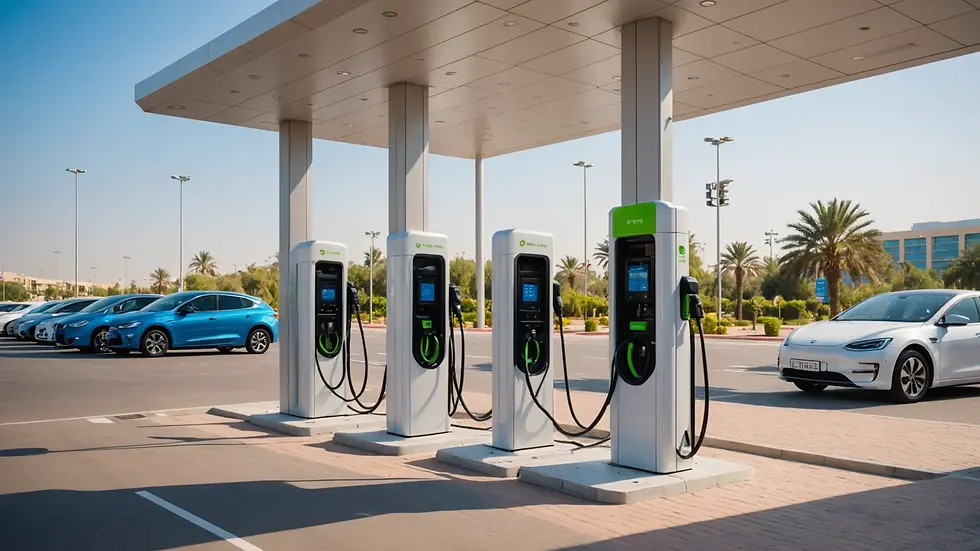The shift towards electric vehicles (EVs) in the UAE is transforming transportation. With the government's push for sustainable practices, the rise of EVs promises reduced emissions and a cleaner environment. However, this transition also raises a crucial question: What happens when these vehicles reach the end of their life cycle? The scrapping of electric vehicles must be carefully managed to prevent environmental damage.
In this post, we will explore the implications of EV scrapping, focusing on both environmental risks and opportunities for recovery.
The Electric Vehicle Boom in the UAE
The UAE has become a leader in promoting electric vehicles. Efforts such as offering rebates, tax exemptions, and developing extensive charging stations have encouraged EV adoption. By 2022, electric vehicles made up 12% of new cars sold in Dubai, showcasing a significant increase in interest.
With UAE's Vision 2021 aiming to decrease carbon emissions by 30%, the integration of electric vehicles is a key part of this plan. Projections suggest that EV sales will continue to rise, which raises questions about their eventual disposal.

Lifecycle and Disposal of Electric Vehicles
Like all products, electric vehicles have a lifecycle that ends with scrapping. Understanding the disposal process is critical. As EVs age, their batteries become a major concern.
Lithium-ion batteries, which contain materials like lithium, cobalt, and nickel, can be recycled for valuable resources. However, if not handled correctly, they pose significant environmental risks, including soil and water pollution. Research from the International Energy Agency indicates that only about 5% of EV batteries are currently recycled efficiently.
Environmental Impact of Electric Vehicle Scrapping
While electric vehicles decrease emissions during use, their scrapping can lead to environmental harm if not properly managed.
Hazardous Waste Management
The disposal of lithium-ion batteries presents a challenge. These batteries contain cobalt and nickel, both of which are harmful to the environment and human health. For instance, studies have shown that the improper disposal of these materials can result in toxic leaks into the water supply.
Efficient recovery systems must be implemented to handle these batteries responsibly. In countries like Norway, which has set ambitious recycling goals, more than 95% of EV batteries are recycled effectively, illustrating a model the UAE can learn from.
Resource Recovery
Electric vehicle scrapping can also benefit resource recovery. Most EV components, such as metals and plastics, can be recycled and reused.
Data from the United Nations suggests that recycling one ton of aluminum can save up to 95% of the energy needed to produce new aluminum. Therefore, establishing robust recycling programs in the UAE can transform what would be waste into valuable resources, reducing the ecological footprint.
Current Scrapping Practices in the UAE
As electric vehicle numbers increase, UAE scrapping practices are evolving. The current system sees collaboration between government agencies, private companies, and environmental organizations.
The UAE is investing in the development of streamlined scrapping processes for EVs. Innovations aimed at standardizing recycling methods will improve how these vehicles are processed once they reach the end of their life.
Regulatory Guidelines
The UAE government has begun to establish regulatory guidelines to govern the disposal of electric vehicles. These regulations aim to promote responsible practices that minimize environmental impacts.
Furthermore, public awareness campaigns are critical in educating consumers about the importance of responsible disposal. In 2021, the UAE launched an initiative that increased awareness of EV recycling options, reaching over 1 million people.
The Future of Electric Vehicle Scrapping in the UAE
With the growing market for electric vehicles, the UAE must adopt proactive scrapping and disposal strategies.
Innovation in Recycling Technologies
Recycling methods for electric vehicle components are expected to evolve significantly. New technologies that improve efficiency in material recovery will emerge.
By investing in research and development, both government and private sectors can drive innovation. This creates a supportive ecosystem that encourages sustainable practices and drives the EV market forward.
Sustainability Initiatives
Future initiatives should focus on sustainability alongside the growth of electric vehicles. Collaborations between the UAE government and private firms can help establish greener methods for managing end-of-life vehicles, thus fostering environmental responsibility.
As the UAE strengthens its sustainable framework, it can emerge as a global leader in environmentally sound vehicle management practices, showing dedication to its development goals.
Final Thoughts on Electric Vehicle Scrapping
The rise of electric vehicles in the UAE offers a path to a more sustainable future. However, the environmental challenges associated with scrapping these vehicles must not be overlooked.
By emphasizing effective recycling practices and creating strong regulatory frameworks, stakeholders can navigate these challenges responsibly. The future of electric vehicle scrapping in the UAE has the potential to be a blueprint for other nations committed to sustainable transportation.
Ongoing dialogue and technological advancements will be vital in maximizing benefits while minimizing negative impacts. Monitoring the recycling and scrapping processes will ensure a truly sustainable future in transportation.

